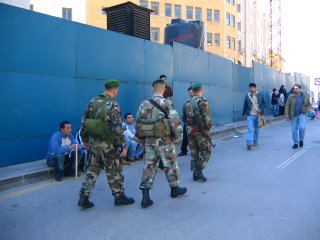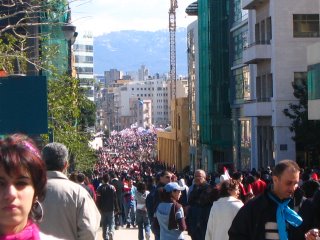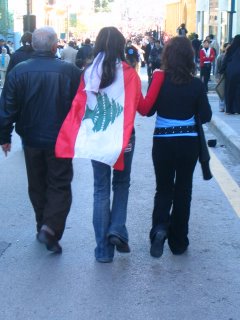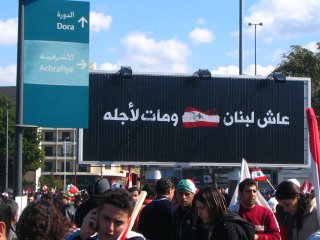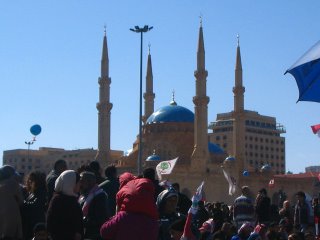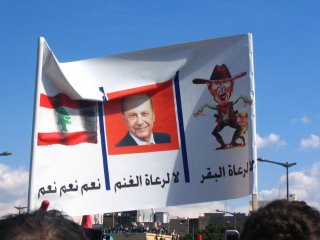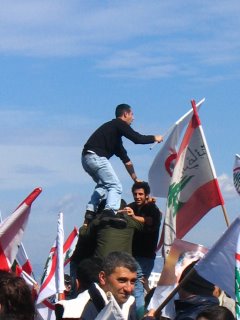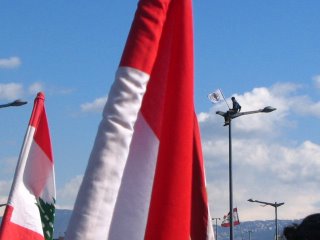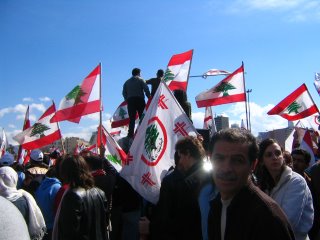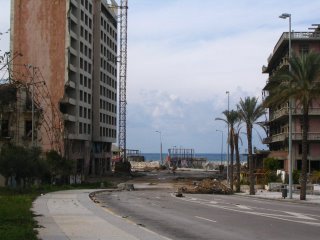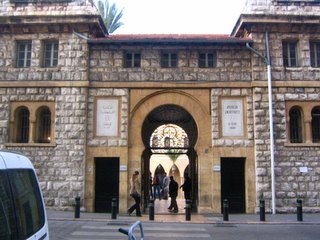before i begin, i'm a little appalled that my post borderline triggered an international conflict. i won't go authoritarian despot on all of you and censor what people say as that would hinder my attempt at creating an open space for response and dialogue, but we should all try to do a better job of making nice.
***
the only way to do this is by categories. i also don't like transitions. this is a cheap and pseudo-inconspicuous way of avoiding them.
1. textbooks
i have so far had 10 days of school. keep that in mind.
i just got my lebanese colloquial arabic book YESTERDAY. i have 2 required books for my arab culture and society class and only one of them has arrived in the aub bookstore and there is no expected date for the other. my ideological trends in the middle east professor -- who is a conspiracy theorist and/or insane, more about him later -- assigned 5 books. instead of doing something that makes sense, like making copies of the articles we're going to read from these books and then getting them bound, for example, he copied all 5 books in their entirety. i suppose that, on the one hand, i should be excited by that since i now have 5 new books on middle east ideology. at the same time, though, i had to pay for 5 books and i only actually need a few chapters from each one.
my israeli politics professor, who is otherwise on top of it, didn't order the books we have to read for his class; he put them on reserve in the library because, as he said, "you never know how many people are actually going to buy the book." my favorite, though, is that the majority of the 6 books for lebanese politics are out of print so even if i wanted to get them, i couldn't. like yezid sayigh (israeli politics), dr. farid el-khazen has also put his entire course reading on reserve.
a note on the reserve system here: you can keep the books on reserve for as long as you want/as long as the person who is in charge of reserves tells you you can, but damn you if you try to take them out of the library. consequently, i spend 1-2 hours in the library every week making copies and sometime this semester, what i need will inevitably be taken out by someone else in the class who will be hiding somewhere in the library where i can't find him and i'll be screwed and then embarrass myself since most of my classes are discussion-based.
i've heard that the students here don't read too much. maybe it's because the professors seem to go out of their way to make it difficult and time-consuming for us to read what they want us to read? perhaps? meh. i never thought i would miss coursepacks so much.
2. the library
things that regularly don't work and should: a) printers. b) copy machines. c) both of the above. any guesses?
on a separate note, much like other libraries i've visited, jafet library has signs in the study area that say "silent" in big letters. departing from tradition, however, these signs are systematically ignored. i would say the study area has a dual purpose: it is a place for congregation and a place to procrastinate since it's blatantly too noisy to actually do any real work. i tried to read in there for about 20 minutes yesterday. during that time, groups of people both in front and in back of me carried on spirited conversations and i heard phones ring approximately 4 times and then i watched their owners pick up. and talk. i thought about beating people up, but i decided it would make too much noise and that would be making a mockery of the sacred idea of the Quiet Library, which would make me a hypocrite and that would be most unfortunate.
3. other ways aub makes things unnecessarily complicated
when it's time to pay tuition at mcgill, i get an email from student accounts informing me that my invoice is ready. upon reading it, i sign onto minerva to check how much i owe and then i sign into royal bank of canada and transfer the money electronically. the whole process takes roughly 2 minutes. i assume this is because mcgill wants me to pay as soon as possible so they make it quick and easy for me to do so.
based on this logic, i have concluded that aub does not, in fact, want my money. i didn't know that tuition was due or that our invoices were online until someone else told me. i checked my aubsis (the equivalent of minerva), figured out how much i needed to pay, and then wrote a personal check. then, on thursday, i went to the comptroller's office. the room is rectangular: the door is on one side, there is some window directly opposite, to the left is student accounts, and to the right is the cashier. i decided to go to the cashier. i waited on line for some time, the guy behind the window typed in some information and mumbled a bit, and then told me that i had to go print out my invoice before i could pay. i went to the library and, obviously, only 1/3 printers was functional and i had to go to class, so i "peaced," if you will.
i beat the system on friday and managed to extract a hard copy of my invoice from an initially unwilling printer. feeling like i had just won a large sum of money, i made my way happily to the comptroller's office. again, i waited for a while, the guy typed and mumbled, and then told me that i had to go to the student accounts window to get my invoice signed before i could pay.
i finally paid my tuition yesterday. there is absolutely no reason why something so basic to the functioning of the university should take 3 working days to accomplish successfully.
another thing that should have been easy and wasn't was webct. (for those who are unfamiliar, webct is a system in which all professors can post material from their courses. it also often includes a discussion board and an internal mail function as well as readings, practice assessments, etc.) at mcgill, if a professor decides to use webct, all of the students' names will automatically be imported. at aub, all students have to manually add their courses. my access, for some reason, was blocked, so i had to go to academic computing services (acs) and prove to them that i was indeed a student registered in the courses i said i was, and then they un-blocked me. now, however, i just found out that another one of my professors will be using webct, which i was not aware of when i went to acs, so i have to go back and ask them if they can re-un-block me and add the last course. if another professor spontaneously decides to use webct, i'm going to protest and/or cry.
4. my classes and the people who teach them
i don't really have any complaints about lebanese arabic except the whole book situation and that it's at 9 everyday, but that's better than 8:25 like last year. also, i despise transliteration. it's an arabic class, freaking give us the pronunciation in arabic letters.
i really enjoy my arab culture and society class. it's an anthropology class, so i am learning to look at things from a different perspective, which i appreciate. as a social science, though, i think social/cultural anthropology has a lot more social than science
my israeli politics class is fantastic. i will devote a whole entry to it after i have one more class, which will be in a week from today.
now...lebanese politics. from what i hear, prof. khazen is kind of a big deal. he was apparently recently elected to the lebanese parliament and, sadly, is only continuing to lecture for the salary. he comes late to class, walks in reluctantly, and then sits down and scowls at us a little before taking attendance, which he does by last name since he clearly has no interest in actually learning who we are. during the lecture, his own boredom periodically overwhelms him and he takes a long, exasperated breath and allows his head to fall heavily into his hands. at the end of each section, he asks if we have any questions, except it's actually a statement since he doesn't really care if we understand, but has been teaching long enough to know that he's supposed to say that.
despite his highly uninspiring performance, people register in his courses en masse and he's always forced to go over capacity. why, you ask?
it's because, when he stops lecturing and steers the class towards discussion, he allows completely unrestricted debate with no regard to decorum or respectfulness, thereby encouraging the voicing of unrefined and knee-jerk ideas. he is aggressive and rude and asks provocative questions that he he knows will trigger emotional responses generally devoid of intellectual consideration. people take his class so they can fight with each other sans safety concerns since they are in the controlled environment of a university classroom.
my ideological trends in the middle east class is equally ridiculous, but for different reasons. i find myself questioning about 75% of what hilal khashan says, whether because it's inconsistent with reality or because it contradicts everything i've ever read. notable examples include claims that:
- iran has never tried to export the islamic revolution.
- the latin american military leaders who took power through the assorted coups that took place throughout the region were interested in enjoying the amenities of being in power, but had no commitment to the countries they were governing.
- pakistan was created to get muslims out of india.
- israel gave iran missiles to fight iraq in 1986, the sixth year of the eight-year iran-iraq war. iran couldn't pay israel for these missiles, however, so israel instead accepted iranian pistachios, and the israeli market suddenly had a mysterious influx of pistachios.
- despite what it seems, iran actually has no problem with the us or israel. the only real enemy of the country is sunni islam.
by the end of the class, all of us were either staring at the professor dumbstruck, debating his points, or trying not to laugh. the class is supposed to be a graduate seminar.
in sum, the education i'm getting here, with the notable exception of israeli politics and arab culture and society and lebanese arabic to a lesser extent, is sub-par. further, the attitude of the students is lax and the excessive bureaucracy presents even those who are committed to learning with obstacles. were the experience i'm having not compensating for what i'm lacking in academics, i would miss mcgill terribly.

